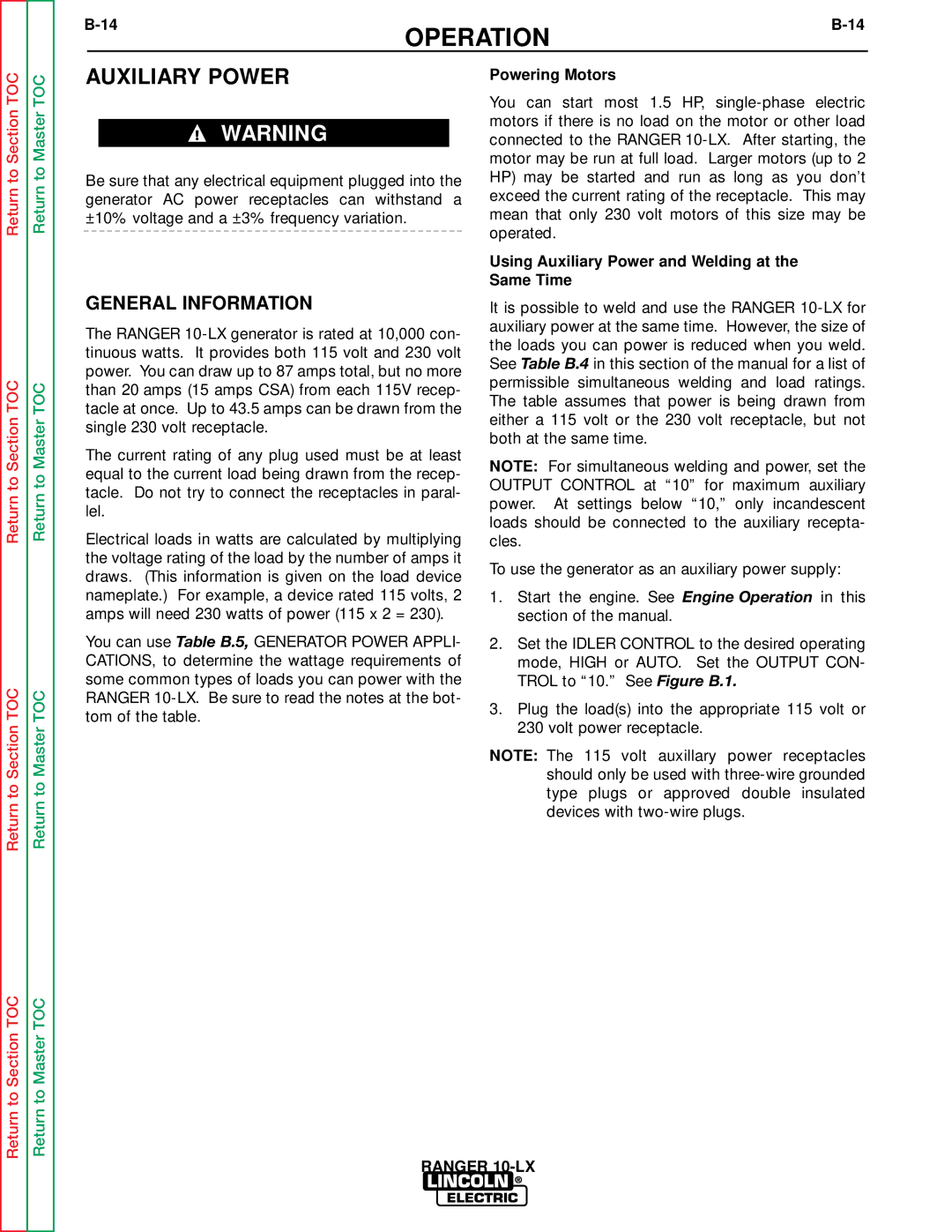
Return to Section TOC
Return to Section TOC
Return to Section TOC
Return to Section TOC
Return to Master TOC
Return to Master TOC
Return to Master TOC
Return to Master TOC
OPERATION |
| ||||||||
|
|
|
|
|
| ||||
AUXILIARY POWER |
|
| Powering Motors |
|
| ||||
|
|
|
|
|
| You can start most 1.5 HP, | |||
|
|
|
|
|
| motors if there is no load on the motor or other load | |||
|
|
| WARNING |
|
| ||||
|
|
|
|
| connected to the RANGER | After starting, the | |||
|
|
|
|
|
| motor may be run at full load. Larger motors (up to 2 | |||
Be sure that any electrical equipment plugged into the | HP) may be started and run as long as you don’t | ||||||||
generator AC power receptacles can withstand a | exceed the current rating of the receptacle. This may | ||||||||
±10% voltage and a ±3% frequency variation. | mean that only 230 volt motors of this size may be | ||||||||
|
|
|
|
|
| operated. |
|
| |
|
|
|
|
|
| Using Auxiliary Power and Welding at the | |||
|
|
|
|
|
| Same Time |
|
| |
GENERAL INFORMATION |
|
| It is possible to weld and use the RANGER | ||||||
The RANGER | auxiliary power at the same time. However, the size of | ||||||||
the loads you can power is reduced when you weld. | |||||||||
tinuous watts. It provides both 115 volt and 230 volt | |||||||||
See Table B.4 in this section of the manual for a list of | |||||||||
power. You can draw up to 87 amps total, but no more | |||||||||
permissible simultaneous welding | and load ratings. | ||||||||
than 20 amps (15 amps CSA) from each 115V recep- | |||||||||
The table assumes that power is being drawn from | |||||||||
tacle at once. Up to 43.5 amps can be drawn from the | |||||||||
either a 115 volt or the 230 volt receptacle, but not | |||||||||
single 230 volt receptacle. |
|
| |||||||
|
| both at the same time. |
|
| |||||
The current rating of any plug used must be at least |
|
| |||||||
NOTE: For simultaneous welding and power, set the | |||||||||
equal to the current load being drawn from the recep- | |||||||||
OUTPUT CONTROL at “10” for maximum auxiliary | |||||||||
tacle. Do not try to connect the receptacles in paral- | |||||||||
power. At settings below | “10,” | only incandescent | |||||||
lel. |
|
| |||||||
|
| loads should be connected to the auxiliary recepta- | |||||||
Electrical loads in watts are calculated by multiplying | |||||||||
cles. |
|
| |||||||
the voltage rating of the load by the number of amps it | To use the generator as an auxiliary power supply: | ||||||||
draws. (This information is given on the load device | |||||||||
|
|
| |||||||
nameplate.) For example, a device rated 115 volts, 2 | 1. Start the engine. See Engine Operation in this | ||||||||
amps will need 230 watts of power (115 x 2 = 230). | section of the manual. |
|
| ||||||
You can use Table B.5, GENERATOR POWER APPLI- | 2. Set the IDLER CONTROL to the desired operating | ||||||||
CATIONS, to determine the wattage requirements of | mode, HIGH or AUTO. | Set the OUTPUT CON- | |||||||
some common types of loads you can power with the | TROL to “10.” See Figure B.1. | ||||||||
RANGER |
|
|
| ||||||
tom of the table. | 3. Plug the load(s) into the appropriate 115 volt or | |
230 volt power receptacle. | ||
| ||
| NOTE: The 115 volt auxillary power receptacles | |
| should only be used with | |
| type plugs or approved double insulated | |
| devices with |
RANGER
